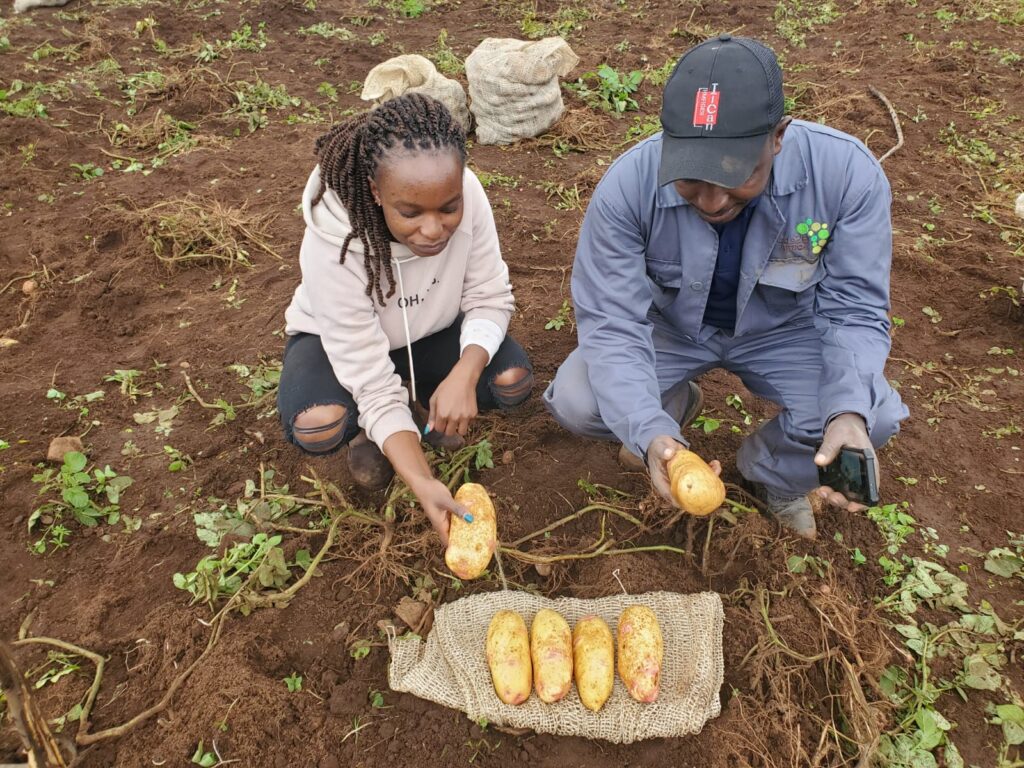Potatoes bred at The James Hutton Institute will help to battle major pest in Kenya
Scientists from the National Potato Innovation Centre (NPIC), based at The James Hutton Institute have introduced two new potato varieties to Kenya, that are now included in Kenya’s National Variety List.
The project was a collaboration with the University of St Andrews, the International Institute of Tropical Agriculture (IITA), the International Potato Center (CIP) and the International Centre of Insect Physiology and Ecology (icipe), as well as the Kenya Plant Health Inspectorate Service (KEPHIS) and Seeds2B.
The new varieties, Malaika, named after the daughter of a farmer who was integral to the early field trials, and Glen, reflecting the Scottish heritage of the varieties, have passed the obligatory National Potato Trials. They have also been approved by processors in Kenya.
They were bred originally in a joint project between Greenvale and Hutton Scientific Services, the commercial arm of the Hutton, and combine the preferred traits of local growers with resistance to potato cyst nematode (PCN), which is currently devastating the Kenyan crop. PCN is a microscopic parasitic pest that invades potato roots, stunting growth and diminishing yields.
Senior Scientist, Professor John Jones, the Hutton and St Andrews lead on the project, said, “The release of these two varieties is the culmination of many years work and is a collaboration between social scientists, crop scientists, plant breeders, the Kenyan Government, seed suppliers and farmers. It has brought together researchers and stakeholders in the UK and in Africa to help ensure that we are providing solutions that are in line with the needs of growers in the region. I’m delighted that we have passed this critical milestone.”
Senior Scientist at IITA, Danny Coyne, said, “It has been a remarkable journey involving multiple partners who combined to ensure the success of this undertaking. PCN is a major pest of a key crop in Kenya, and the region, and the delivery of Malaika and Glen marks a major breakthrough for controlling this pest.”
“The release of these two varieties is the culmination of many years work and is a collaboration between social scientists, crop scientists, plant breeders, the Kenyan Government, seed suppliers and farmers.”
Prof John Jones The James Hutton Institute

Potato is the second most important food crop in Kenya after maize and benefits some 2.5 million people across the potato value chain. With an approximate value of $500 million per annum, potato is a key economic agricultural driver for Kenya.
The Hutton leads the world in scientific research and breeding programmes aimed at developing new potato varieties with desirable agronomic characteristics and resilience to external stresses, such as temperature extremes and diseases. Malaika and Glen have the potential to be of value in the countries surrounding Kenya where PCN is also present and to provide reliable, resilient crops that offer a route to food security.
Research carried out as part of the project showed that Kenyan smallholder farmers need potato varieties that have low dormancy (the length of time before they start to develop sprouts) that can be replanted quickly after harvest, and that are fast cooking to reduce fuel use.
Currently around 90% of growers source seed from their own farm or from neighbours, with only 6% buying from certified seed suppliers. The information collected during this project will be used to shape plans for distributing the new potatoes and to give growers the confidence to grow these new varieties. Their introduction will now be scaled up by working with Kisima seeds for the commercial sector, while Syngenta Foundation Farmers’ Hubs will provide advice and multiply healthy seeds for smallholders.
